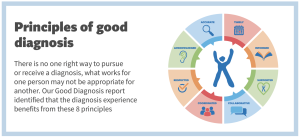Good mental health and emotional wellbeing is important to everyone. There is growing awareness of the importance of addressing the mental and emotional needs, as well as physical needs, of people living with long term conditions.
This includes rare conditions, where a long journey to diagnosis, lack of coordinated care, low awareness among health professionals and few treatments can make it harder to cope.
Our policy report Living with rare conditions: the effect on mental health sets out the findings of a study carried out to help develop a fuller, clearer picture of the relationship between rare disease and mental health.
If you are struggling with the impact of a rare condition and need to talk, you can look over our sources of support.
Supporting rare mental health during the Covid-19 pandemic
During the Covid-19 pandemic, we noticed an immediate impact on the mental health of those leading charities and support groups for people living with rare conditions. Many leaders in our community are driven by their personal experience of living with a rare condition or caring for a loved one who lives with a rare condition, which placed huge pressure on them personally at a time of significant professional pressure as demand for their charity’s services increased.
Genetic Alliance UK raised emergency funds to deliver the Building Rare Resilience programme in collaboration with RareMinds. The course gave staff from our member organisations the opportunity to take part in 12 weekly sessions to build their emotional resilience and wellbeing.
We also delivered four Building Rare Resilience workshops in collaboration with two of our members, Beacon and RareMinds. Each workshop had over 50 attendees and focused on a different topic to help rare community leaders build skills to look after their own mental health while supporting their communities.


